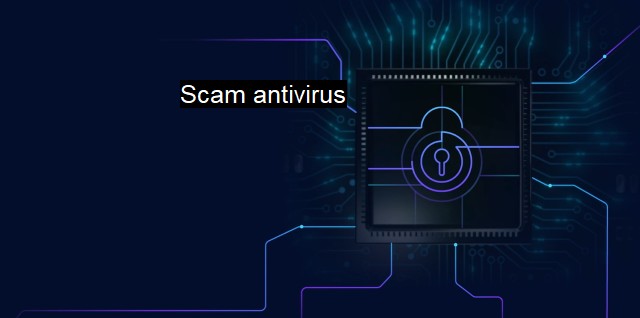What are Scam antivirus?
Unveiling the Threat of Scam Antivirus: How Malicious Software Puts Your Cybersecurity at Risk
"Scam Antivirus" , also known globally as rogue security software, is a trick designed to mislead and essentially defraud users into believing their personal computer has been severely compromised by threatening malware, ransomware, or virus, and the only solution is to download or purchase unnecessary, veritably worthless, or downright harmful programs masked as legitimate software.As a point of entry into its deceptive framework, scam antivirus typically infiltrates computers through deceptive tactics, such as "phishing" emails– these emails masquerade as credible and urgent safety warnings from notable service providers, urgent pleas predicated on fabricated breaches of security. Such ploys aim to create an air of panic, ushering the user into download harmful software or input vital information, willingly, under the false pretense of fortifying their cybersecurity.
While the methods through which these scam antivirus programs infiltrate computers are multiplex and extensively creative, their operation generally abides by a similar makeup. Once installed or downloaded on an unwary user's system, these so-called antivirus solutions would launch a "system scanning" process, transfiguring the computer’s regular proceedings into a pantomime of a genuine system scan being done by an authentic antivirus suite. The algorithms they employ make your computer system appear infested with serious threats, hiding benign files and programs under the elaborate guise of infected properties.
These misleading scans often followed notifications that direct users to make an immediate purchase of a 'premium' version, supposedly armed with powerful mechanisms to annihilallate the made-up threat. Users, caught up in the pandemonium of potentially losing their priceless data, end up getting hoodwinked and spur-of-the-moment pay for a service designed not to protect but to infiltrate their wallets.
Equally worrying is that the scam antivirus program itself may be bundled with hidden malicious software designed to steal data. In supplying their personal information, such as credit cards, passwords, for the purchase of the alleged premium antivirus package access, users are essentially handing their private information to cyber-criminals.
The targets of such fraudulent operations are broad-ranging and indiscriminate– from individual users and households to small businesses and large firms with their exponential amounts of data. It also spans different operating systems such as windows, mac, android, making it a global cybersecurity concern.
An effective way to avert these scam antivirus threats is user education. Understanding the modus operandi of these rogue security software systems enables users to identify legitimate security warnings and dodge intrusive phishing emails or ill-meaning browser pop-ups. Most operating systems provide regular security updates that help keep systems safe; equipped with additional authentic security software, systems would be hardened to prevent unauthorized access or downloads.
Virtual vigilance takes paramount importance in safeguarding online security. It is always crucial to investigate and fully understand the authenticity of email links, download prompts, and newly installed software. Avoid downloading any emails from unfamiliar sources and reject requests for personal information or payment unless verified. Importantly, always utilize up-to-date software and strong firewalls to shore up the foundations of a workable online security protocol.
Scam antiviruses present a severe threat to individual and collective cybersecurity protocols, posing risks of information theft, financial losses, and damage to infrastructure. Exercising thorough digital hygiene, mindfulness during online navigation, and implementing sound and verified security software compositions the intertwined reassurances necessary – catching, before they hatch - yet another devious ploy hidden in the labyrinthine world of cybersecurity.

Scam antivirus FAQs
What is a scam antivirus?
A scam antivirus is a type of malware that disguises itself as legitimate antivirus software. It tricks users into purchasing fake antivirus programs that claim to be effective in protecting their computer systems. Scam antiviruses are designed to deceive and defraud unsuspecting victims.How can I recognize a scam antivirus?
Scam antiviruses often use aggressive marketing tactics such as pop-ups and fake security alerts to trick users into purchasing their products. They may also claim to have found a large number of malware threats on your system and request payment to remove them. Be suspicious of any antivirus software that asks for payment information without first providing a free trial or legitimate product information.What are the dangers of using a scam antivirus?
Using a scam antivirus can be dangerous because it provides a false sense of security. Scam antiviruses do not effectively protect your computer from malware threats and may actually put your system at greater risk by spreading more malware. Additionally, scam antiviruses may steal personal data and financial information from unsuspecting users.How can I protect myself from scam antiviruses?
To protect yourself from scam antiviruses, always research an antivirus program before you download it. Read reviews from reputable sources, and use online resources to help you identify legitimate antivirus software. Be wary of unsolicited emails, pop-up ads or phone calls claiming to offer antivirus software. Use reputable antivirus software that is known to provide effective malware protection.| | A | | | B | | | C | | | D | | | E | | | F | | | G | | | H | | | I | | | J | | | K | | | L | | | M | |
| | N | | | O | | | P | | | Q | | | R | | | S | | | T | | | U | | | V | | | W | | | X | | | Y | | | Z | |
| | 1 | | | 2 | | | 3 | | | 4 | | | 7 | | | 8 | | |||||||